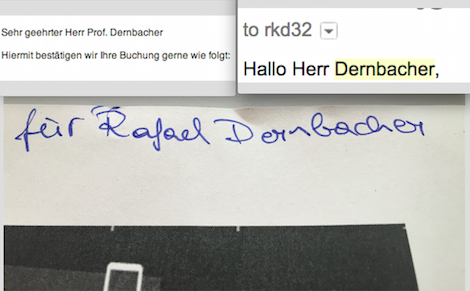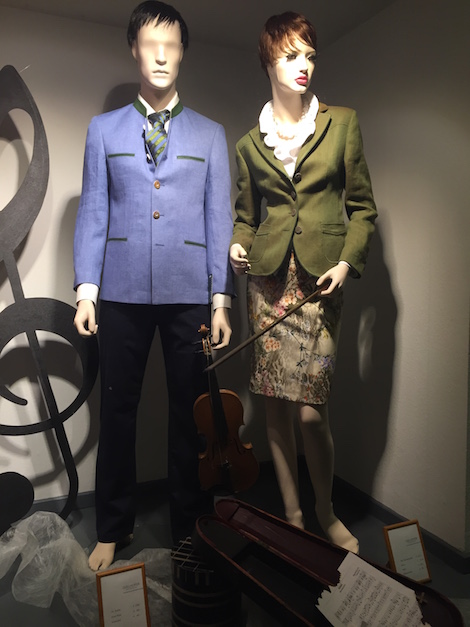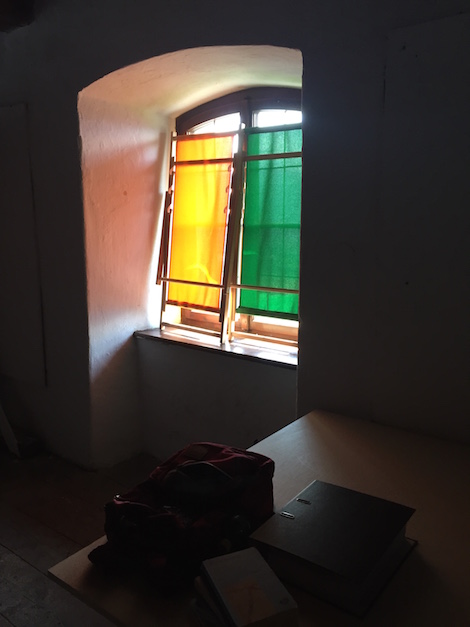| « 2 / 30 Revelations | Luis Camnitzer » |
1 / 30 Anticipations
Sometimes when you come to live at a new place, you are given a new name. In my case, my name has been consequently Austrianized since arriving in Salzburg. Rafael Dernbach became Rafael Dernbacher. And as Rafael Dernbacher I am your blogger in residence for the next six weeks. From today I will write for you once a day about the academy in Salzburg.

This blog is a collection of my fieldnotes. Fieldnotes are descriptive. They do not add what has not been there. However, they document subjective encounters and exchanges rather than objective certainties. They are stories intertwined with materials, and materials intertwined with stories. Already from these terms - field, observation, exchanges - you can guess that my blogging is guided by a set of methods. My methods here are anthropological. Anthropology is the study of the everydayness of a particular social space. What happens every day? How does it happen? What are the concerns and hopes of people? What is shared and what is not shared?
Often we know exactly what we do, but have no idea how we do it: driving a car, surviving a job interview or playing an instrument are only a few examples. All these activities happen semi-consciously. They constitute our everydayness. We learn them every day in more or less oblique ways. This is also true for art. And I am going to observe the more and less tangible ways in which art is taught at the summer academy. My fieldnotes thus aim to go beyond the obvious, by paying utmost attention to it.
J: You want to be what?
J: A diplomat.
J: Are you rich?
J: No.
J: Can you legitimately add a famous name to your surname?
J: No.
J: Then forget diplomacy.
J: But what'll I become?
J: Curious.
J: That's not a profession.
J: Not yet, travel, write, translate. Learn to live everywhere.
J: Begin at once.
J: The future belongs to the curious.
Truffaut Jules et Jim
“Everydayness is a knowledge that lies as much in the objects and spaces of observation, as in the body and mind of the observer.” Michael Taussig
The first image that strikes me in Salzburg is a larger-than-life picture of the concerned faces of Angela Merkel and Wolfgang Schäuble. A 3x2 meter LED screen at the train station reminds everybody: don’t forget, we are still in a moment of crisis. Merkel and Schäuble, these icons of austerity don’t leave you alone in Europe. There is no public space without them. After their serious concern a logo appears: Kronenzeitung.

As soon as I leave the train station I feel the humid tropical heat of the city. The sky is covered by dark clouds. They strew the thinnest summer rain over the city that I have ever seen. This is my first sensual experience of Salzburg: you can walk for thirty minutes in the rain without getting soaked. I meet some of the teachers and staff of the academy for dinner at Gasthaus Hinterbrühl, an Austrian restaurant at Schanzlgasse. Everybody is standing outside in the summer rain, watching the interplay between clouds and sun and avoiding the heat inside the pub.
S: So what are doing?
R: I study observation.
S: Don’t we all? And I can tell you this will never stop.
I am surprised to meet several people that have been part of the summer academy for more than 25 years. I did not imagine that an institution that physically only exists once a year for a few weeks has such continuity. Stephen first came as a student to the academy in 1985. Through his class he got to know a collective of print makers from Salzburg with whom he started a long-term collaboration. He also met his wife at the academy and eventually became a Salzburger. I am impressed how his American accent in English switches from one second to an Austrian accent in German. During the summer he works as technician for the academy.

The room is too bright. Although photographers are the painters of light, they need the darkness. Not only for their work and practice, but also for reflection. This is the window in the room of Jayce Salloum’s photography group. Two chairs to protect the sparse light of a projector.
“Anybody is jetlagged? No? So we are all in the same time zone.”
Jayce Salloum sits at a t-shaped table, to his left his assistant Antoinette Zwirchmayr. All the students are assembled around him.
“I take years to develop one work, so everything here is going to be compressed.”
“We are going to look at how images play off with each other.”
“What does it mean to produce images in an image economy?“
Somebody comes late to class.
“Did you get arrested? Or kidnapped?”
“I am sorry, Europe is so scientific.”
“Yeah, in Europe, people don’t do hand gestures a lot.”
It is interesting that talking about failures is an important aspect of Salloum’s classes. He tells that he wanted to become a National Geographic photographer as a student and only when realizing that this was not “his thing”, his practice entered a new stage. He creates an atmosphere of mutual vulnerability with his stories. A careful, caring but also a demanding vulnerability.
“If we are all taking the same pictures, then there is nothing to look at. If we are all thinking the same, somebody isn’t thinking.”

